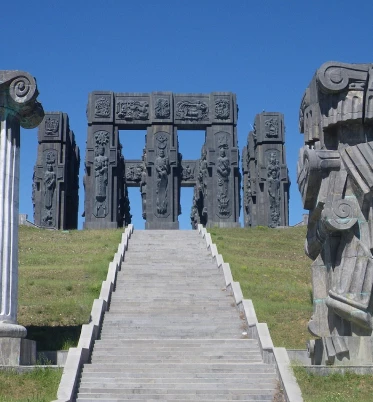GEORGIA HISTORY
Georgia history is a rich and complex tapestry of political, cultural, and social developments that have shaped the country over the centuries. Understanding this history is essential for comprehending modern-day Georgia, its unique cultural identity, and its role in the wider region. From the earliest human settlements to the present day, Georgia has experienced a range of historical events that have left their mark on its people, language, religion, and traditions.

Early History
Georgia history dates back to ancient times, with evidence of human habitation dating back to the Paleolithic era. The region was home to various prehistoric cultures, including the Colchian and Kura-Araxes cultures. Later, the ancient kingdoms of Colchis and Iberia emerged in the region, with Colchis becoming a notable center of trade and culture in the ancient world. These early periods of Georgia’s history laid the foundation for the country’s unique culture, traditions, and identity.
Medieval Era
During the medieval era, Georgia experienced a golden age under the Bagrationi dynasty, which lasted from the 9th to the 13th century. This period saw the rise of a strong, centralized state with a powerful military, extensive trade networks, and flourishing art and literature. Georgia made significant cultural and religious contributions to the region, including the development of a unique form of Christianity known as the Georgian Orthodox Church. Despite political and economic challenges from neighboring empires such as the Mongols and the Ottomans, Georgia maintained its independence and cultural identity.

Modern Times
In modern times, Georgia’s history has been marked by its incorporation into the Russian Empire in the early 19th century, followed by a brief period of independence after the fall of the empire in 1917. However, this independence was short-lived, as the Soviet Union annexed Georgia in 1921. Georgia history during this period includes significant political, economic, and social changes, as well as challenges such as civil wars, territorial conflicts, and Russian interventions. However, Georgia has also made progress in strengthening its institutions, diversifying its economy, and enhancing its international partnerships, positioning itself as a strategic player in the Caucasus and beyond.
Conclusion
In conclusion, the history of Georgia Country is a rich and complex tapestry that reflects its diverse cultural, political, and economic experiences over time. From its early origins to its golden age under the Bagrationi dynasty, from its incorporation into the Russian Empire to its struggle for independence and post-Soviet transition, Georgia history has shaped its identity and aspirations in the modern era. While facing geopolitical challenges and promoting regional integration and global engagement, Georgia continues to draw upon its historical legacy to chart its course forward.
A rich tapestry of culture and resilience, Georgia's history
weaves tales of triumph and diversity.
Georgia History FAQ
Georgia's history dates back to ancient times, with evidence of human habitation dating back to the Paleolithic era.
Georgia developed a unique form of Christianity known as the Georgian Orthodox Church.
In modern times, Georgia's history was marked by its incorporation into the Russian Empire in the early 19th century.
CONTACT US FOR ANY QUESTIONS
Core responsibilities of Human Resource Management

Common Types of HR Services
3box. Culture and different internal policies all have a significant impact on employee retention and engagement. This extremely important for growing businesses and start-ups. For sustainable growth, a big-picture strategy managed by HR professionals or service providers will be key.
It is necessary to develop and maintain a systematized framework to discover opportunities and enhance work performance, while ultimately contributing to the betterment and value of the entity.
Stay ahead in a rapidly changing world
The solution WP consulting came up with combined cutting edge technology with real world practicality. Everyone knew that the systems had to be updated, the real challenge was updating them without disrupting the whole organization in a negative way. The solution was to introduce proper workload management done through computers, while providing mobile platforms to the stakeholders.
This allowed the workers to be involved in the job instead of feeling like they had been made redundant by technology.

The biggest challenge was that Arguzo was not utilizing technology properly. Too much of the work was still being recorded manually, which meant that the numbers took a long time to note down and then to be analyzed. Live data was also not available and decisions can only be made after all the required data and been received. This was holding Arguzo back; they knew they could corner more of the market if they had the ability to be more mobile. The work addressed three critical issues for Pharm Ltd.:
The biggest challenge was that Arguzo was not utilizing technology properly. Too much of the work was still being recorded manually, which meant that the numbers took a long time to note down and then to be analyzed. Live data was also not available and decisions can only be made after all the required data and been received. This was holding Arguzo back; they knew they could corner more of the market if they had the ability to be more mobile. The work addressed three critical issues for Pharm Ltd.:
The biggest challenge was that Arguzo was not utilizing technology properly. Too much of the work was still being recorded manually, which meant that the numbers took a long time to note down and then to be analyzed. Live data was also not available and decisions can only be made after all the required data and been received. This was holding Arguzo back; they knew they could corner more of the market if they had the ability to be more mobile. The work addressed three critical issues for Pharm Ltd.: